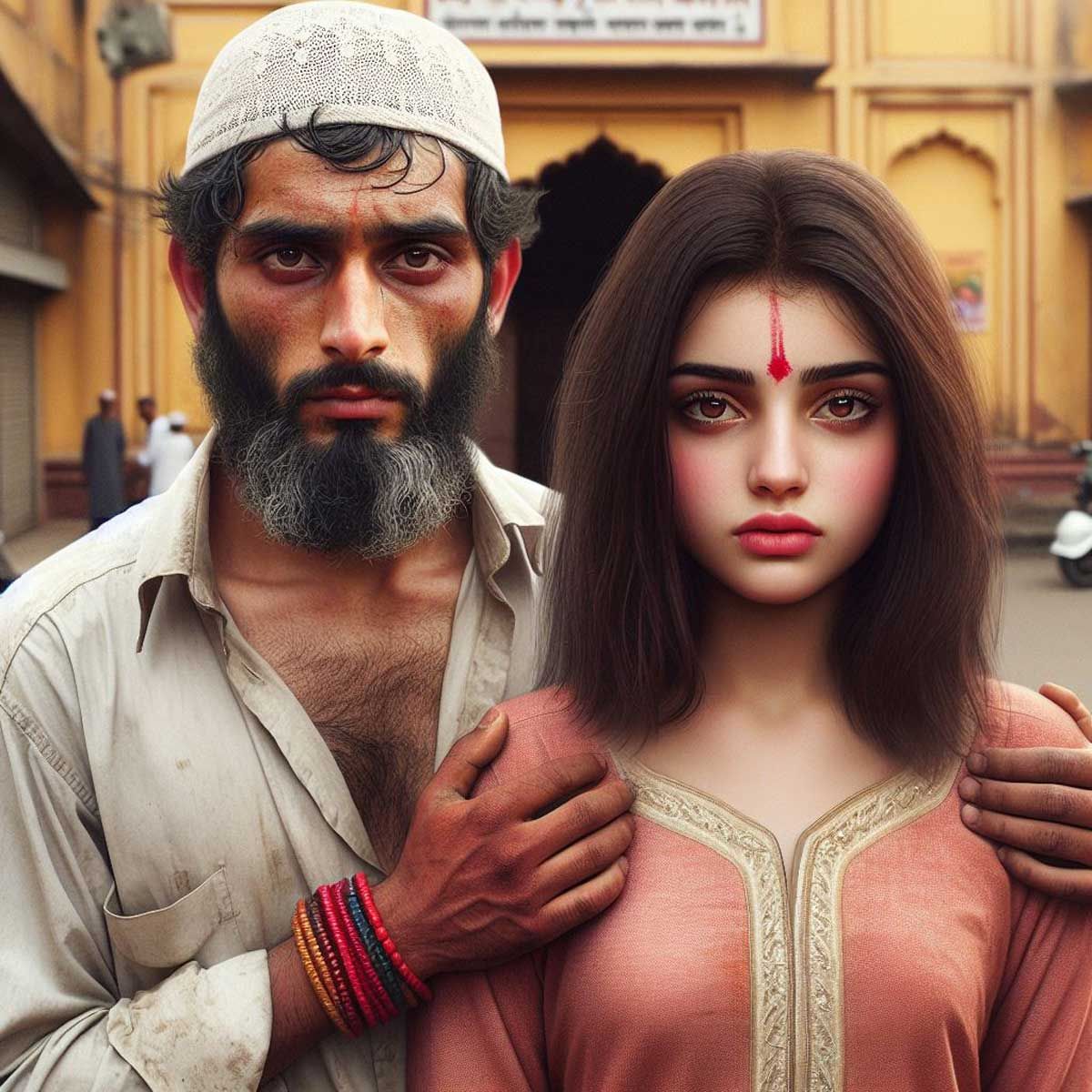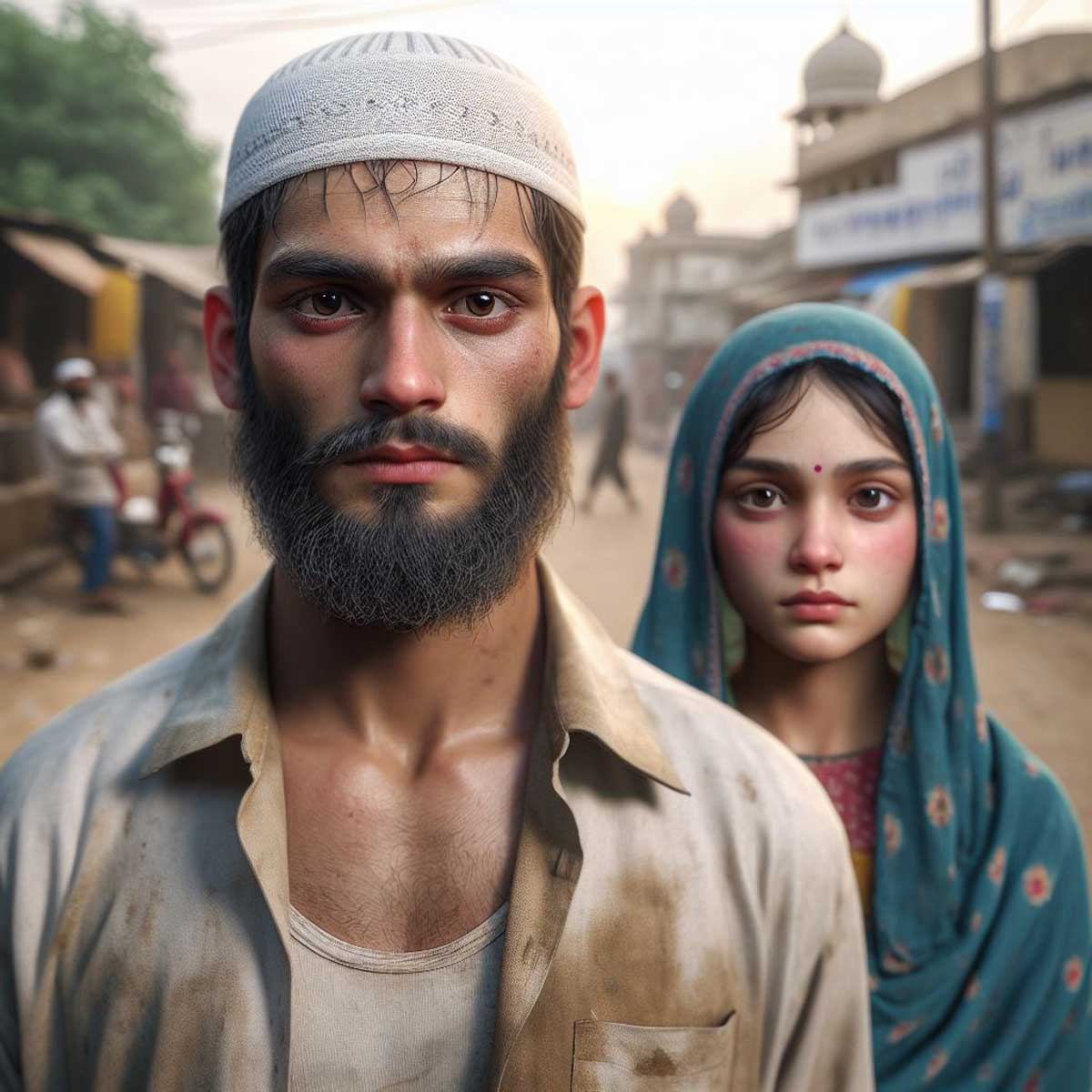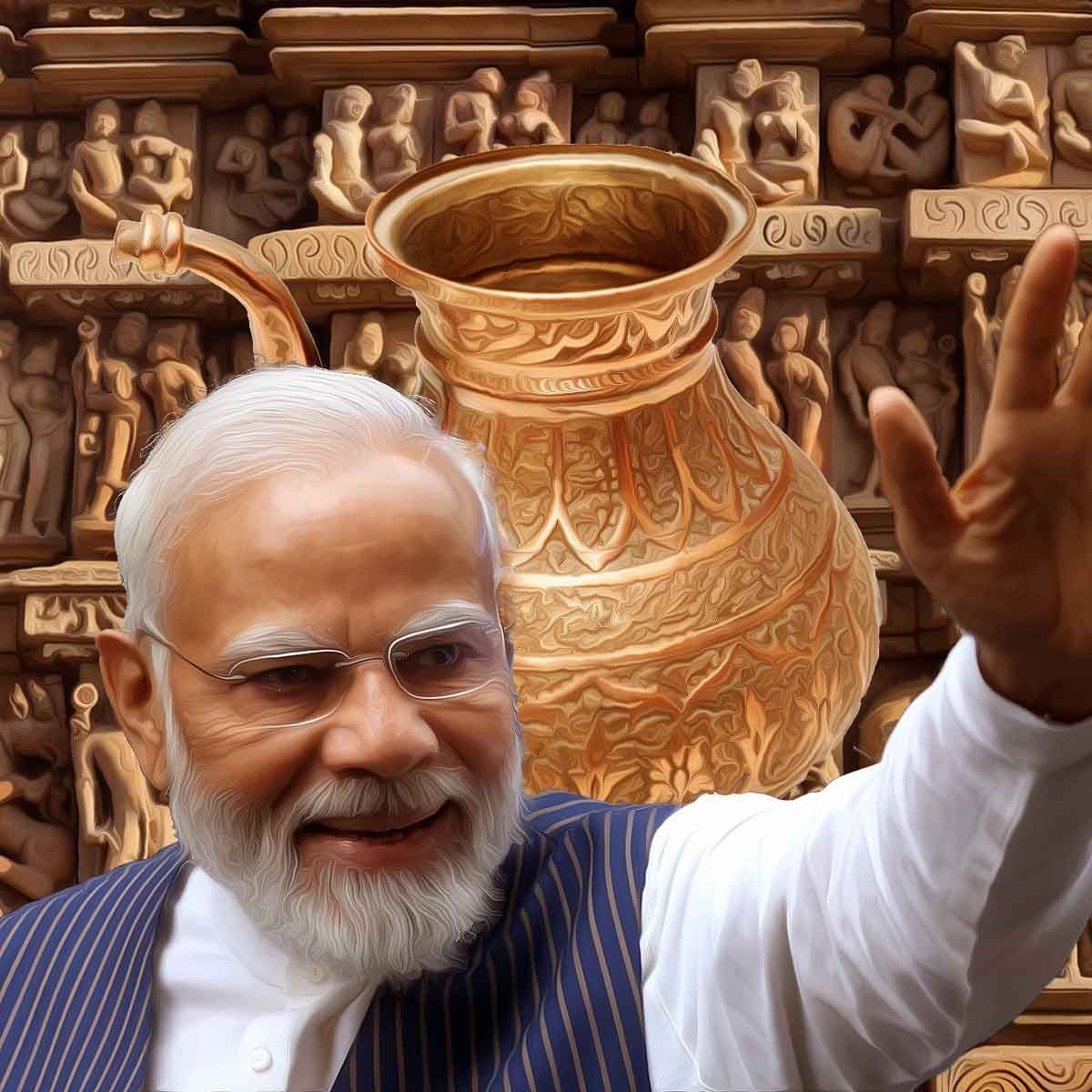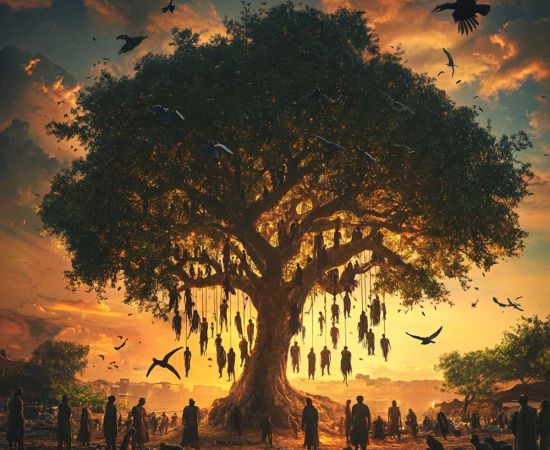MORE COVERAGE
Twitter Coverage
Satyaagrah
Written on
Satyaagrah
Written on
Satyaagrah
Written on
Satyaagrah
Written on
Satyaagrah
Written on
JOIN SATYAAGRAH SOCIAL MEDIA
Amroha Love Jihad case, Chand arrested after Bajrang Dal's timely intervention, alerted by Chand's lawyer, he was arrested for raping, abducting, and forcefully converting a minor Hindu girl into Islam, he went to the court to marry her, POCSO applied

In an unsettling incident from Amroha, Uttar Pradesh, authorities have intervened in a matter that has stirred considerable concern among the local community and beyond. This case brings to light not just the personal tragedy of a young girl but also broader issues of religious freedom and personal safety.
Chand, identified as a member of the Muslim community, has been taken into custody by the state police on grave charges. He is accused of sexually assaulting a Hindu girl, a serious violation of her physical and psychological well-being.
But the allegations extend beyond physical assault, he even raped her several times and also forcing the girl to convert to Islam, an act that has deep personal and societal implications. This forced conversion is not just about changing one’s religion; it’s about stripping someone of their identity and freedom of belief.
Further intensifying the gravity of the situation, Chand compelled the girl to marry him in accordance with Islamic traditions. As part of this forced union, he changed her name to ‘Shabnam’. This act of renaming her is symbolic, representing a forced change of identity that goes beyond mere nomenclature. It is an attempt to erase her past and assimilate her into a new religion and culture against her will.
The repeated rapes on the girl underscore a pattern of control and domination. These actions have not only caused physical harm but have also left psychological scars, affecting her sense of security and self-worth.
|
Responding to these alarming events, Usha Sharma, a proactive member of the ‘Nari Utthan Kendra’, a non-governmental organization dedicated to women's rights in Uttar Pradesh, has stepped forward. By filing an FIR, Sharma has initiated legal proceedings, seeking justice for the victim. The police have subsequently charged Chand under specific sections of the Indian Penal Code (IPC) and the Protection of Children from Sexual Offences (POCSO) Act. The invocation of the POCSO Act highlights the recognition of the victim's vulnerability and the serious nature of the offenses committed against her.
On Saturday, 27th January, became a significant marker for a small community in Uttar Pradesh. Chand, whose home is in Shahpur Kalan within the jurisdiction of Hasanpur Kotwali, found himself at the center of a contentious situation. He exerted undue pressure on a young Hindu girl, a resident of the Rajpura area under Sambhal’s police station, coercing her into the idea of marriage. This act of coercion, where one party is forced or pressured beyond their will, raises significant concerns about the autonomy and rights of the individual, especially when that individual is a vulnerable teenager.
The situation took a more dire turn when Chand decided to escalate his actions from mere pressure to an outright abduction. He took the significant and illegal step of abducting the girl, removing her from her familiar surroundings and taking her to Amroha court. His intent was clear: to marry the girl through a court marriage, a legal process that, under these circumstances, was marred by the lack of consent and the forceful nature of the abduction.
The lawyer of Chand made a call to individuals associated with Hindu organizations, requesting their presence. Concurrently, the police were alerted and promptly arrived at the location.
Amidst these developments, a group of Hindu activists associated with the Bajrang Dal, a Hindu nationalist organization known for its vigilant stance on interfaith matters, became aware of the situation. Their attention was particularly drawn to the couple under circumstances they found suspicious, leading them to suspect an instance of what they termed as 'love jihad'. This term is controversially used to describe situations where Hindu women are allegedly forced or tricked into converting to Islam under the guise of love and marriage. The activists' cognizance of the couple's situation set the stage for a broader confrontation, rooted in the complex interplay of religious identity, personal autonomy, and community norms.
As the situation unfolded, it became evident that the girl involved was below the legal age. Subsequently, law enforcement authorities took action by apprehending the accused, identified as Chand, the son of Shamshad from Shahpur Kalan. This sequence of events highlights the collaborative efforts between legal representatives, law enforcement agencies, and concerned individuals to address the circumstances surrounding the minor Hindu girl and ensure accountability for those involved.
|
District Convenor Kushal Chaudhary, Co-Convenor Virendra Kumar, and Abhishek, representing the leadership of the organization, promptly arrived at the location of the incident. Their arrival was not solitary; they were accompanied by other members of their organization as well as a considerable number of local residents. This gathering of people, both from the Bajrang Dal and the wider community, underscored a collective demand for justice. The presence of a significant local population alongside these activists highlighted the community's united stance against what they perceived as a grievous wrongdoing, calling for strict action against Chand for his actions.
The response from the community and the Bajrang Dal members was swift when Chand attempted to escape the scene. In a moment that emphasized the seriousness with which the community viewed the accused's actions, Hindu workers present at the spot managed to catch Chand as he tried to flee.
Once Chand was caught, he was handed over to the police, marking a crucial step towards ensuring that the allegations against him would be thoroughly investigated.
Simultaneously, the teenage girl at the center of this incident was presented before the Child Welfare Committee. The involvement of the Child Welfare Committee is a testament to the system's commitment to the protection and care of minors, ensuring that the girl would receive the necessary medical treatment and support.
In the aftermath of the distressing events that transpired in Amroha, Uttar Pradesh, the legal system took decisive action to address the grave allegations brought against Chand. A case was meticulously registered, taking into account the severity and nature of the accusations. The legal charges laid against Chand and any identified accomplices were significant, encompassing both the Protection of Children from Sexual Offences (POCSO) Act and the Religious Conversion Act.
|
Additionally, rape charges were filed against Chand, highlighting the seriousness with which the authorities viewed the alleged sexual assault and multiple rapes. This legal action followed a formal complaint lodged by Usha Sharma, a dedicated member of the Nari Utthan Kendra—an organization committed to the upliftment and protection of women. Sharma’s involvement underscores the critical role that civil society and women's rights groups play in bringing such cases to light and ensuring that they are pursued by the legal system.
The investigation into the case revealed deeply troubling details about the nature of the conversion and marriage. Chand was found to have forcibly converted the Hindu girl to Islam, an act that involved changing her name to Shabnam, erasing her original identity, and compelling her into a nikah, an Islamic marriage ceremony. This forced conversion and marriage, conducted under duress, starkly illustrates the manipulation and control exerted over the girl, stripping her of her agency and religious freedom.
In the midst of these proceedings, the girl was placed in a safe house—a protective measure aimed at ensuring her safety and well-being.
The broader discourse surrounding this case taps into the contentious debate over the concept of 'Love Jihad'—a term used by some to allege a systematic effort by Muslim men to convert Hindu women through marriage. Critics of the concept argue that it is a construct of right-wing propaganda, designed to stoke communal tensions. However, proponents point to recurring reports of similar cases as indicative of a disturbing pattern. They argue that these incidents reveal a method of exploitation and conversion that preys on vulnerable individuals under false pretenses, leading to sexual assault and forced religious conversion.
This case, set against the backdrop of such a heated debate, not only highlights the individual tragedy of the girl involved but also reflects broader societal tensions. It underscores the challenges faced in navigating issues of religious freedom, personal autonomy, and the protection of vulnerable individuals within the complex tapestry of India's diverse and multifaceted society.
 |
 Support Us
Support Us
Satyagraha was born from the heart of our land, with an undying aim to unveil the true essence of Bharat. It seeks to illuminate the hidden tales of our valiant freedom fighters and the rich chronicles that haven't yet sung their complete melody in the mainstream.
While platforms like NDTV and 'The Wire' effortlessly garner funds under the banner of safeguarding democracy, we at Satyagraha walk a different path. Our strength and resonance come from you. In this journey to weave a stronger Bharat, every little contribution amplifies our voice. Let's come together, contribute as you can, and champion the true spirit of our nation.
 |  |  |
| ICICI Bank of Satyaagrah | Razorpay Bank of Satyaagrah | PayPal Bank of Satyaagrah - For International Payments |
If all above doesn't work, then try the LINK below:
Please share the article on other platforms
DISCLAIMER: The author is solely responsible for the views expressed in this article. The author carries the responsibility for citing and/or licensing of images utilized within the text. The website also frequently uses non-commercial images for representational purposes only in line with the article. We are not responsible for the authenticity of such images. If some images have a copyright issue, we request the person/entity to contact us at satyaagrahindia@gmail.com and we will take the necessary actions to resolve the issue.
Related Articles
- "This is the law: blood spilt upon the ground cries out for more": Rape Jihad struck again in Lakhimpur, one more Hindu girl lost the battle of life when resisted rape attempt by Islamist Saleemuddin and Aashif, was thrashed in her home while being alone
- In a landmark UP verdict, Anees Ahmed was sentenced to life for raping and converting a Hindu girl to Ayesha, posing as Akash; he also stole Rs 2.5 lakh & gold before leaving, court fined him Rs 4.56 lakh, with Rs 3.50 lakh as compensation to the victim
- "जुनून-ए-इश्क़": A rickshaw puller in Indore, Arshad Pathan posed as Harish, raped a Hindu woman, forced unnatural sex, forced her to convert, his brother Sabir also raped her, and their family intimidated her; police booked and all six absconding
- "दिलजले": Love Jihad in Uran, 22-year-old Yashashree Shinde was brutally murdered by Dawood Sheikh, her decomposed body found with severe mutilation of genitals & face near the Uran-Panvel railway line; Sheikh arrested at the Maharashtra-Karnataka border
- "ये इश्क़ नहीं आसाँ": In Odisha horror, Samir Mansoor befriends Hindu girl via online game, hides his religion, rapes her in hotel, force her to convert to Islam in a love jihad case, blackmails with videos & extorts ₹5 lakh from her family before arrest
- 16-year-old Hindu girl, Arti Kumari Das went missing on March 5, to be later found dead near railway tracks in Bongaigaon, Sarfaraz Hussain is detained on the suspect of coercion and love jihad, sparking protests and a strong community demand for justice
- When 19-year-old Upasana vanished after meeting Tauheed Ali in Unnao, no one knew her remains would be found scattered in a jungle—blackmail, betrayal, and a police lapse let jealousy turn fatal, until a dramatic encounter exposed the chilling truth
- "वल्लाह": Dr. Ahabbar Hussain, masquerading as Aman Dikshit, deceitfully married and converted a Hindu woman and her young daughter to Islam in Deoband, got her raped by his friends, exploited her illiteracy and language barriers for his sinister motives
- Ali Siddiqui, posing as 'Monu Yadav', orchestrates a 'Love Jihad' in UP, leading to the assault of a minor, this chilling case exposes the perils of digital deceit, and the critical role of POCSO & law enforcement in shielding young from such treachery
- "War does not determine who is right — only who is left, so buckle up": Mohammed Naeem Mian posed as Sandeep Singh to lure a Hindu girl into a love trap, married her, raped her minor sister and recorded the act, now threatening to make the video viral
- "शफीक और मेरा प्यार फेविकॉल का जोड़": Shafiq Ansari gruesomely slits throat of Hindu girlfriend with a knife that he bought to peel apple for her & pushed her body down a hill, had spent last night together, was ‘upset’ because she was not talking to him
- "Child molestation is a touchy subject... Read the papers! Half the country's doing it!": Maulvi Rashid drags a 17-year-old girl inside a mosque and attempts to rape her, family members dragged Maulvi outside the mosque & brutally assaulted him, arrested
- "Daughter can be slave too": Maharashtra - Ashpak Sheikh drugged and raped minor daughter of his love jihad victim for 3 years, used to show her porn and forced to dance naked, now arrested, police activate POCSO Act, her missing mother is still a mystery
- "Umeed na kar tera katil kuch juda niklega, siddat-e-jihad amal kar aman hasil niklega": Hindu girl trapped, abducted, and abused by Ali Asgar of Chhota Udaipur pretended to be ‘Anil Jaiswal’, rapes and blackmails a Hindu girl, police arrested the accused
- "अल्लाह तआला": Raxaul - A 12-year-old minor girl is critical after being brutally gang-raped for days by YouTuber Sohail Ansari and his gang, who often impersonated police & journalists to ensnare victims, threatened her family with death for speaking out



























